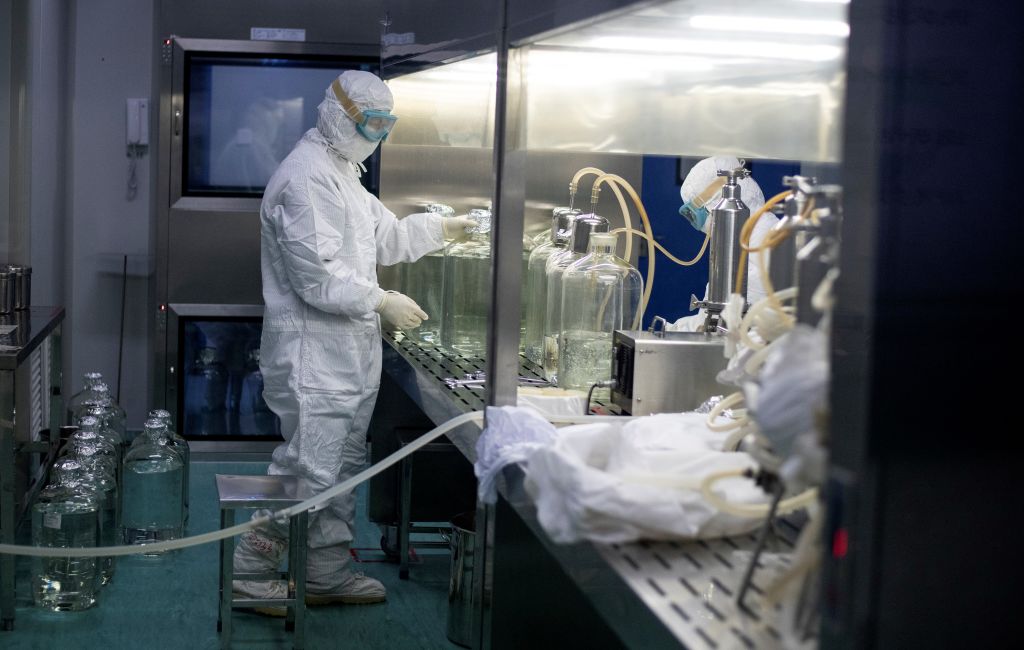China's top COVID-19 vaccine candidate showed weak results among older Phase II test subjects


A free daily email with the biggest news stories of the day – and the best features from TheWeek.com
You are now subscribed
Your newsletter sign-up was successful
China's CanSino Biologics reported preliminary results of its Phase II COVID-19 vaccine trial Monday, and there was promising news. But it was overshadowed by the results of the Oxford University-AstraZeneca vaccine, also published Monday in the journal The Lancet. Both vaccines, among the top contenders in the global race for a coronavirus immunization drug, produced strong immune responses with only minor side effects, but older trial participants showed significantly weaker responses in the CanSino trial, suggesting two doses may be needed.
CanSino's vaccine appears "pretty weak compared to other vaccine candidates (to the extent that comparisons are possible)," said Prof. John Moore at Weill Cornell Medical School. However, comparing the immune response among different vaccines is tricky, he added, "like judging a beautiful baby photo contest when every mom uses a different Instagram filter."
The Oxford-AstraZeneca vaccine and CanSino's candidate both use genetically deactivated adenoviruses that mimic the new coronavirus and stimulate an immune response. But while Oxford's vaccine uses an adenovirus found in chimps, CanSino relies on an adenovirus that causes the common cold in humans. Monday's CanSino study "revealed that people who had previously been exposed to the cold virus showed weaker immune responses to the coronavirus vaccine — presumably because their immune systems zeroed in on the familiar component of the vaccine, the weakened cold virus, rather than SARS-CoV-2," Politico explains.
The Week
Escape your echo chamber. Get the facts behind the news, plus analysis from multiple perspectives.

Sign up for The Week's Free Newsletters
From our morning news briefing to a weekly Good News Newsletter, get the best of The Week delivered directly to your inbox.
From our morning news briefing to a weekly Good News Newsletter, get the best of The Week delivered directly to your inbox.
CanSino and Oxford-AstraZeneca already have large-scale Phase III trials underway to judge their vaccines' efficacy, and CanSino's is the only COVID-19 vaccine approved for use, though approval is limited to China's military. Monday's reports show that "each of these vaccines is worth taking all the way through to a Phase III study," Dr. Peter Jay Hotez, a vaccine researcher at the Baylor College of Medicine, tells The New York Times. "That is it. All it means is 'worth pursuing.'"
A free daily email with the biggest news stories of the day – and the best features from TheWeek.com
Peter has worked as a news and culture writer and editor at The Week since the site's launch in 2008. He covers politics, world affairs, religion and cultural currents. His journalism career began as a copy editor at a financial newswire and has included editorial positions at The New York Times Magazine, Facts on File, and Oregon State University.
-
 How the FCC’s ‘equal time’ rule works
How the FCC’s ‘equal time’ rule worksIn the Spotlight The law is at the heart of the Colbert-CBS conflict
-
 What is the endgame in the DHS shutdown?
What is the endgame in the DHS shutdown?Today’s Big Question Democrats want to rein in ICE’s immigration crackdown
-
 ‘Poor time management isn’t just an inconvenience’
‘Poor time management isn’t just an inconvenience’Instant Opinion Opinion, comment and editorials of the day
-
 TikTok secures deal to remain in US
TikTok secures deal to remain in USSpeed Read ByteDance will form a US version of the popular video-sharing platform
-
 Unemployment rate ticks up amid fall job losses
Unemployment rate ticks up amid fall job lossesSpeed Read Data released by the Commerce Department indicates ‘one of the weakest American labor markets in years’
-
 US mints final penny after 232-year run
US mints final penny after 232-year runSpeed Read Production of the one-cent coin has ended
-
 Warner Bros. explores sale amid Paramount bids
Warner Bros. explores sale amid Paramount bidsSpeed Read The media giant, home to HBO and DC Studios, has received interest from multiple buying parties
-
 Gold tops $4K per ounce, signaling financial unease
Gold tops $4K per ounce, signaling financial uneaseSpeed Read Investors are worried about President Donald Trump’s trade war
-
 Electronic Arts to go private in record $55B deal
Electronic Arts to go private in record $55B dealspeed read The video game giant is behind ‘The Sims’ and ‘Madden NFL’
-
 New York court tosses Trump's $500M fraud fine
New York court tosses Trump's $500M fraud fineSpeed Read A divided appeals court threw out a hefty penalty against President Trump for fraudulently inflating his wealth
-
 Trump said to seek government stake in Intel
Trump said to seek government stake in IntelSpeed Read The president and Intel CEO Lip-Bu Tan reportedly discussed the proposal at a recent meeting
